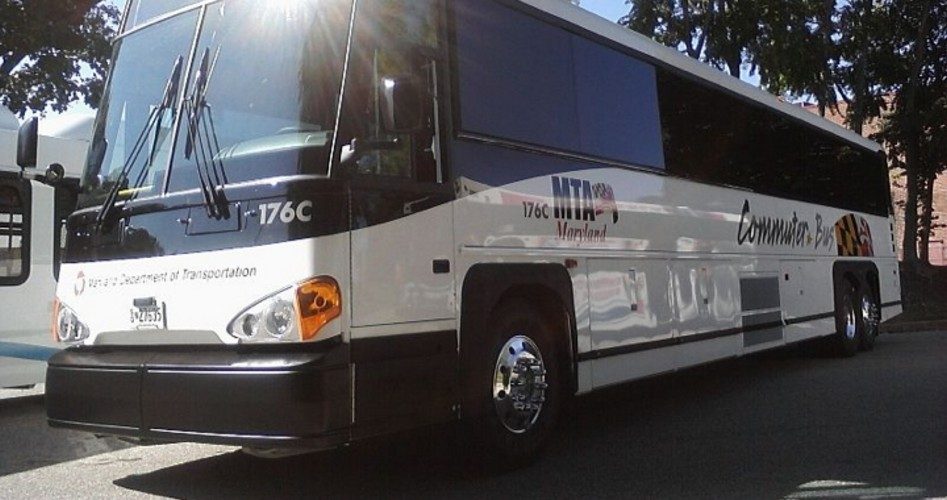
City officials in Baltimore have established public transportation policies that constitutionalists and state legislators say infringe upon the rights of its citizens. According to the Baltimore Sun, Maryland Transit Administration authorities have announced that audio devices are being added to its buses to record private conversations in order to “investigate crimes, accidents and poor customer service.”
The Baltimore Sun writes,
The first 10 buses — marked with signs to alert passengers to the open microphones — began service … in Baltimore, and officials expect to expand that to 340 buses, about half the fleet, by next summer.
Microphones are incorporated in the video surveillance system that has been in place for years.
Each bus will be equipped with an aviation black box that will store 30 days of audio and video information. In the event of an accident involving passengers or a complaint against a driver, the device can be removed from the locked equipment box and downloaded to be reviewed.
According to the MTA, the purpose of the program is to ensure passenger safety.
“We want to make sure people feel safe, and this builds up our arsenal of tools to keep our patrons safe,” said Maryland Transit Administration chief Ralign Wells. “The audio completes the information package for investigators and responders.”
Not everyone is convinced by this statement, however. Natural News observes, “It’s appropriate to remind readers that ‘public safety’ is the excuse of choice for authoritarians who no longer feel constrained by the Constitution.”
Wells claims that the cost of the initiative is insignificant since the cameras are able to record audio and all new buses will have audio-video systems as standard equipment. He indicates that the system is legal per the state attorney general’s office, and notes that letters were sent to the American Civil Liberties Union and unions representing the bus drivers. The Baltimore Sun explains,
A spokesman for the attorney general’s office confirmed that transit officials were advised by their counsel that based on a 2000 appeals court decision, the audio recordings did not violate the state wiretapping law.
But attorneys with the ACLU disagree. One lawyer said he was “flabbergasted” with the MTA’s decision to record conversations, particularly after a similar proposal was rejected in 2009 by the state’s highest ranking transportation officials and also by the General Assembly on three separate occasions.
In 2009, the secretary of the Maryland Department of Transportation rejected a proposal similar to this one and called for more review before adopting such a controversial policy.
Maryland ACLU staff attorney David Rocah stated,
People don’t want or need to have their private conversations recorded by MTA as a condition of riding a bus. A significant number of people have no viable alternative to riding a bus, and they should not be forced to give up their privacy rights.
But transit officials insist that the boxes are necessary to protect bus drivers as well. According to MTA dispatchers, 45 to 100 calls come in daily for assistance from bus drivers who are dealing with unhappy riders or criminal activity on their buses.
Likewise, Captain Bruna McCollum, commander of the MTA police technical services division, insisted that video is necessary for investigators to help determine the cause of accidents, as witnesses are often unreliable as they generally do not stay at the scene of an accident, are frequently reluctant to cooperate, and often provide contradictory accounts.
The Washington Metropolitan Area Transit Authority and Southeastern Pennsylvania Transportation Authority also use video devices on their buses but do not record passengers’ conversations as Baltimore’s system does.
Members of the state Senate Judicial Proceedings Committee are unhappy with the MTA’s decision to record passengers.
Sen. James Brochin, a Baltimore County Democrat, declared,
It’s an end run and ripe for a court challenge. They have absolutely no grounds to do this. If we can’t get them to listen and change their minds, we’ll deal with this … and make them defend what’s indefensible.
When House and Senate committees individually look at a proposal and nearly unanimously reject it, you know it’s bad public policy.
Similarly, Senator Jamie Raskin, a Montgomery County Democrat, observed that the system “sounds kind of Big Brotherish to me,” suggesting that bus riders should have been consulted before such a policy was established. “This is such a giant step forward in dissolving the privacy expectations of people who ride the bus,” he added. “Legislators are going to want to know what the compelling reason is for initiating this now.”
However, MTA customer service investigator Melvin Stukes contends that the purpose of the new policy is to eliminate bad language that results in violence and that officials should not be afraid to challenge the bus unions or the ACLU:
This is not your bathroom. This is not your bedroom. Buses are public spaces and people are elbow to elbow. I’m not trying to punish people. I’m just trying to clean up problems I hear about every day so that people realize that MTA is trying to provide a more congenial, more cordial ride.
Ultimately, the use of recording devices on city buses will likely have to be resolved by the Maryland legislature.
Senator Brian Frosh, Montgomery County Democrat, stated,
If this is something that’s necessary and useful, standards must be set for oversight and accountability. The job of figuring this out definitely should not be left to the agency doing the listening.
Photo of Maryland Transit Administration bus




